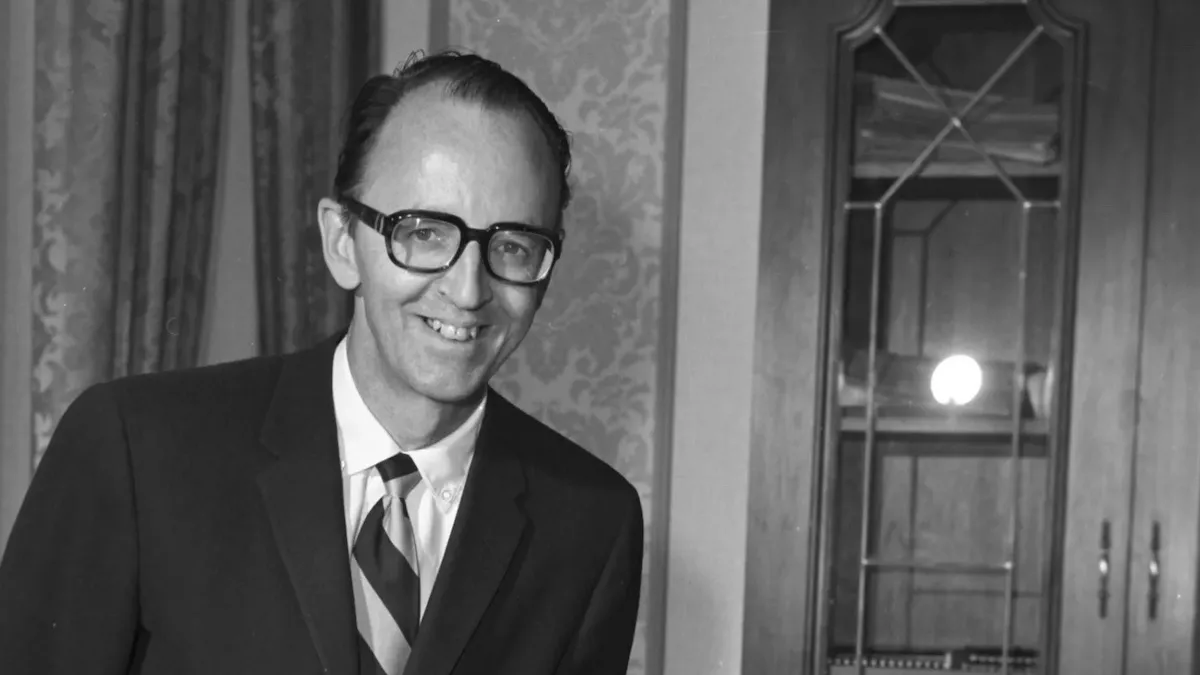Rod Sykes, mayor of Calgary from 1969 to 1977, is reported to have died in the past few days.
During his three consecutive terms in office, James Rodney Winter Sykes put in motion major projects that continue to benefit Alberta’s largest city, among them development of the iconic Calgary Tower, Calgary’s downtown convention centre, and the city’s sprawling light-rail transit system. He was 95.
A notice of Mr. Sykes’ death, which occurred on January 3, was published by his family on January 8.
Andrew Marshall, author of the only biography of Sykes and a member of the mayor’s staff for three years during a break from his long career as a Calgary Herald journalist, described Sykes, “despite his thin frame,” as “a larger than life character, who, in the first half of his life, was committed to supporting the regular citizen – young, old, working people, immigrants.”
“I marvelled at the fearlessness, the unvarnished outrageousness of this ectomorphic oddball; not to mention his iron will to complete worthwhile projects,” Marshall wrote in Thin Power: How Former Calgary Mayor Rod Sykes Stamped His Brand on the City … And Scorched Some Sacred Cows, which was published in 2016.
While Sykes became more conservative, even reactionary, in his later years, Marshall told me in a note yesterday about Sykes’ passing, “during his years as mayor, he loved taking on sacred cows such as the Stampede Board, Chamber of Commerce, University of Calgary, and, of course, our dear Calgary Herald, then a loyal mouthpiece for the Calgary Establishment.”
“His anti-establishment stances may be the reason that, as far as I know, there is not a single official recognition of his role as three-term mayor,” Marshall said in his note. “Nothing so modest as a miserable cul-de-sac has been named after him.”
Marshall remembered how it was Sykes who had the vision of a light-rail system in Calgary, and worked hard to persuade the city to purchase the right of way and rolling stock required for it.
“Mayor Ross Alger, who followed him, tried to put the brakes on that project, but Alger’s successor, Ralph Klein, continued to push it,” Marshall wrote in 2016. As a result, Klein, mayor of Calgary from 1980 to 1989 and later premier of Alberta, often gets the credit that Sykes deserved.
Sykes described himself with more than a little justice as “God’s gift to cartoonists.” He was a gift to old-style journalists too, never afraid of a noisy public fight with anyone, including the most powerful members of Cowtown’s establishment – and that inevitably meant many of the people most municipal politicians are too terrified to cross.
Not Rod Sykes. The Chamber of Commerce, the almighty Stampede Board and the Herald, which in those long-gone days saw itself as the Newspaper of Record of Southern Alberta, all felt the sting of his wrath. He once publicly described yet another of my former fellow Herald colleagues as a “chicken-shit operator,” prompting a headline writers to solemnly declare, “Mayor uses fowl language on reporter.”
Despite his blunt language, Sykes was able to build what Marshall called “an amazingly broad coalition of support” that enabled him to overcome the opposition of his powerful and well-connected fellow citizens. For his part, Sykes once explained his aggressive debating style like this: “When you have someone down, don’t walk away with them still breathing.”
Born in Montreal on May 19, 1929, raised on Vancouver island, and an accountant by trade, Sykes’ “hawk-eyed accountancy skills,” said Marshall, enabled him to spot and root out the cozy financial relationships with government that thrived in those days in Calgary – and will again soon if the United Conservative Party gets its way in the next municipal election.
Sykes thought subsequent Calgary mayors, including Klein, squandered his legacy by neglecting city services and allowing the mayor’s authority to be diluted to the point that when Klein became premier, he could declaw mayors’ powers in that year’s revision of the Municipal Government Act.
Sykes also spent a short, unsuccessful period as the leader of Alberta’s Social Credit Party from 1980 to 1982. In that role, Marshall observed yesterday, he presents a cautionary tale for another three-term Calgary mayor, Naheed Nenshi, now leader of the Alberta NDP, about what can happen when mayors turn to provincial politics.
“Under Sykes’ leadership in the early 1980s, the once-mighty Alberta Social Credit Party collapsed into oblivion.” Marshall said. “He was not a good team player. As a mayor, used to making decisions on his own, he lacked the ability or desire to share responsibilities.”
NOTE: This story has been updated with the date of Mr. Sykes’ death to reflect the publication of a notice in The Calgary Herald by his family on Jan. 8. The notice states that in accordance with the wishes of their father, a private Catholic funeral mass for family will be held at a later date.



